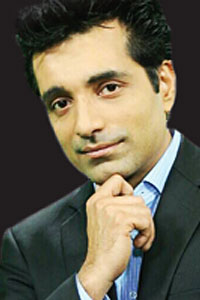Over the past few weeks the leaders of this country have been talking a lot about how Thailand belongs to Thais and not foreigners, and there's no need for international observers to verify everything we are doing in this country.
There is no doubt that this country belongs to its citizens, and that they should be the ones who choose the direction they want their country to take.
However, the fact is that most of the people in this country will not see the future they want. This is because a group of people with its own vested interests has stacked the deck against public participation and transparency.

Umesh Pandey is editor, Asian Focus.
Having been born here and lived through a few coups, I'm used to seeing people in uniform take charge to "tackle corruption" (the reason for every coup) and restore social harmony. But these days I'm dismayed that the calls to allow us Thais to make our own decisions and have meaningful checks and balances seem to be falling on deaf ears.
These concerns have arisen amid the debate over whether Thailand should follow the norms of the global community and allow international observers to monitor the Aug 7 referendum on the divisive draft charter created by the military-appointed Constitution Drafting Committee.
Every democratic country in the world would agree that the role of observers is critical in any kind of plebiscite. This was the case last year in Ireland when its citizens voted on same-sex marriage (approved) and a proposal to lower the age of candidates for president to 21 from 35 (rejected). Similarly, observers were present when the people of the Falkland Islands voted in 2013 to remain a British territory.
In Asia referendums have taken place in countries from Bangladesh to the Philippines to Japan. All have featured observers who certified the process to be generally clean, fair and transparent.
Recent cases where observers have been viewed as something of a social evil involve countries ruled by military dictators. Among them is Pakistan, where Gen Pervez Musharraf ousted an elected government in 1999.
Gen Musharraf in 2002 proposed to extend his term as president for another five years and a referendum was held in which 97.97% of the people agreed. The government said the voter turnout was 57% but opposition parties said the figure was barely 6%.
There was no way to verify the actual numbers because nobody was allowed to be present for the vote. The government was in total control and it got the result it wanted.
A similar story unfolded in Myanmar in 2008 when the military junta asked the public to vote on a new constitution, designed to entrench a large military role in future elected governments. It claimed a 99% voter turnout and 92.4% approval, which no one could confirm. But even a rigged constitution could not prevent the landslide that Aung San Suu Kyi's party won last November. The military still has a lot of power, but it must take a back seat to elected representatives chosen freely by the country's citizens.
Pakistan today is also under civilian rule with Nawaz Sharif, the man Gen Musharraf ousted, back in the prime minister's seat.
At the end of the day, those in power can try to manipulate the results all they want, but when the voters speak in truly fair elections, the people's choice will prevail, no matter whether it is a developed or developing country.
The fact that Thailand's current government is so hostile to the idea of foreign observers only makes the charter referendum process more dubious than it already is.
Even the previous coup leader allowed close to 200 international observers to participate when the 2007 constitution was put to a vote, and that was one of the key reasons the charter generally reflected the people's wishes.
The bulk of the international observers in 2007 were from our Asean neighbours, whose wellbeing is strongly linked to political and economic stability in Thailand.
Thailand's citizens today have many questions for the military about how it intends to maintain power even after a new elected government is in place. One can legitimately ask how powerful a 250-member senate, handpicked by the military and overseeing politicians like an Iran-style Guardian Council, will be.
Everyone who has any knowledge about constitutions and democracy is asking questions about what is behind the charter. They deserve more respectful treatment than to be accused of being "not Thai" whenever they express honest criticism or call for international observers.
